Livestock Agriculture in Australia Does Not Kill the Climate
VerifiedAdded on 2023/04/17
|9
|1820
|384
AI Summary
This article explores the impact of livestock agriculture on climate change and debunks the misconception that it is the leading source of greenhouse gas emissions. It discusses the environmental and nutritional implications of abandoning meat and highlights the importance of sustainable livestock rearing. The study focuses on the methods through which animal agriculture influences air quality and climate change, providing evidence to counter the claim that meat production significantly contributes to climate change. It also emphasizes the role of livestock in meeting nutritional requirements and the economic benefits it provides to small-scale farmers in developing and emerging economies.
Contribute Materials
Your contribution can guide someone’s learning journey. Share your
documents today.

INTERNATIONAL RELATIONS
By Name
Course
Instructor
Institution
Location
Date
By Name
Course
Instructor
Institution
Location
Date
Secure Best Marks with AI Grader
Need help grading? Try our AI Grader for instant feedback on your assignments.
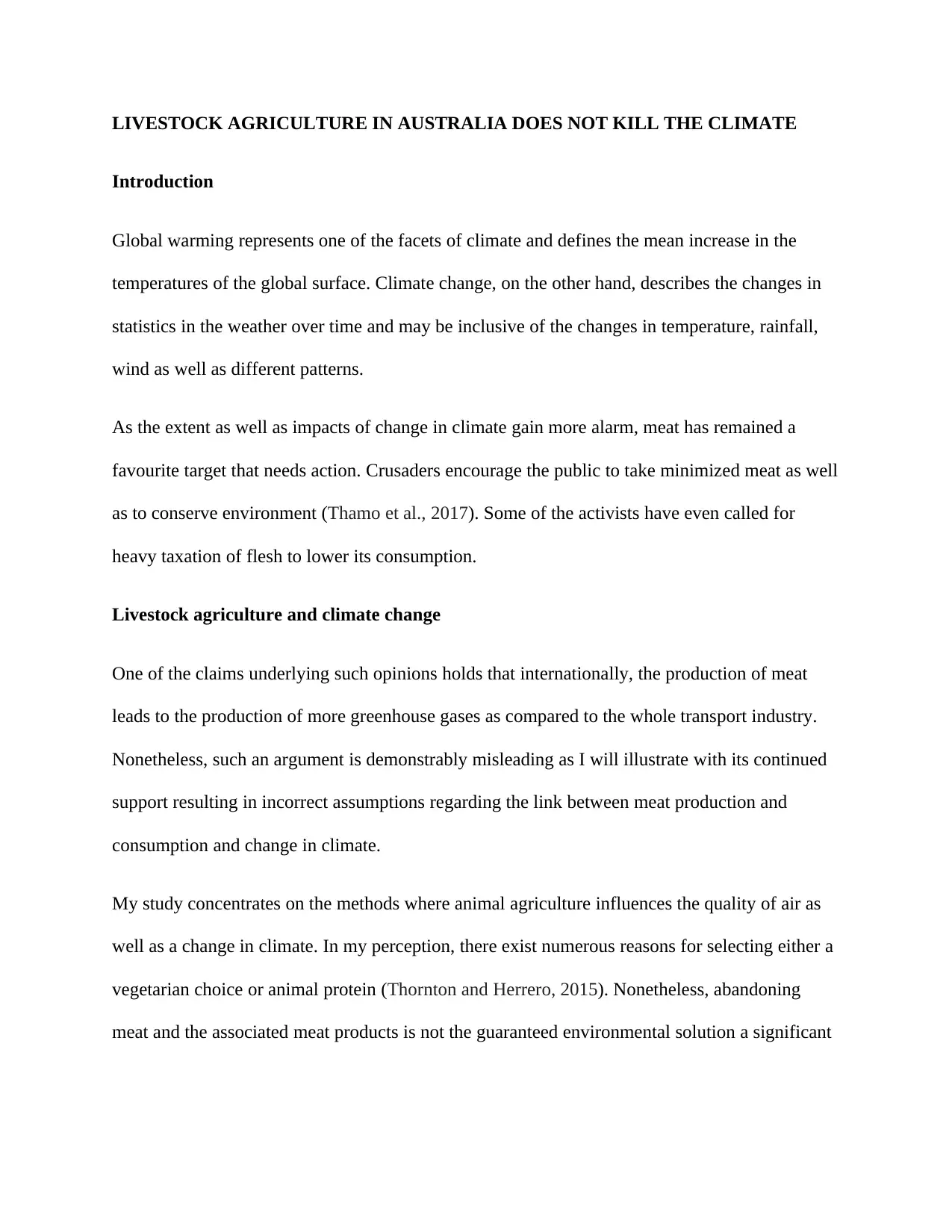
LIVESTOCK AGRICULTURE IN AUSTRALIA DOES NOT KILL THE CLIMATE
Introduction
Global warming represents one of the facets of climate and defines the mean increase in the
temperatures of the global surface. Climate change, on the other hand, describes the changes in
statistics in the weather over time and may be inclusive of the changes in temperature, rainfall,
wind as well as different patterns.
As the extent as well as impacts of change in climate gain more alarm, meat has remained a
favourite target that needs action. Crusaders encourage the public to take minimized meat as well
as to conserve environment (Thamo et al., 2017). Some of the activists have even called for
heavy taxation of flesh to lower its consumption.
Livestock agriculture and climate change
One of the claims underlying such opinions holds that internationally, the production of meat
leads to the production of more greenhouse gases as compared to the whole transport industry.
Nonetheless, such an argument is demonstrably misleading as I will illustrate with its continued
support resulting in incorrect assumptions regarding the link between meat production and
consumption and change in climate.
My study concentrates on the methods where animal agriculture influences the quality of air as
well as a change in climate. In my perception, there exist numerous reasons for selecting either a
vegetarian choice or animal protein (Thornton and Herrero, 2015). Nonetheless, abandoning
meat and the associated meat products is not the guaranteed environmental solution a significant
Introduction
Global warming represents one of the facets of climate and defines the mean increase in the
temperatures of the global surface. Climate change, on the other hand, describes the changes in
statistics in the weather over time and may be inclusive of the changes in temperature, rainfall,
wind as well as different patterns.
As the extent as well as impacts of change in climate gain more alarm, meat has remained a
favourite target that needs action. Crusaders encourage the public to take minimized meat as well
as to conserve environment (Thamo et al., 2017). Some of the activists have even called for
heavy taxation of flesh to lower its consumption.
Livestock agriculture and climate change
One of the claims underlying such opinions holds that internationally, the production of meat
leads to the production of more greenhouse gases as compared to the whole transport industry.
Nonetheless, such an argument is demonstrably misleading as I will illustrate with its continued
support resulting in incorrect assumptions regarding the link between meat production and
consumption and change in climate.
My study concentrates on the methods where animal agriculture influences the quality of air as
well as a change in climate. In my perception, there exist numerous reasons for selecting either a
vegetarian choice or animal protein (Thornton and Herrero, 2015). Nonetheless, abandoning
meat and the associated meat products is not the guaranteed environmental solution a significant
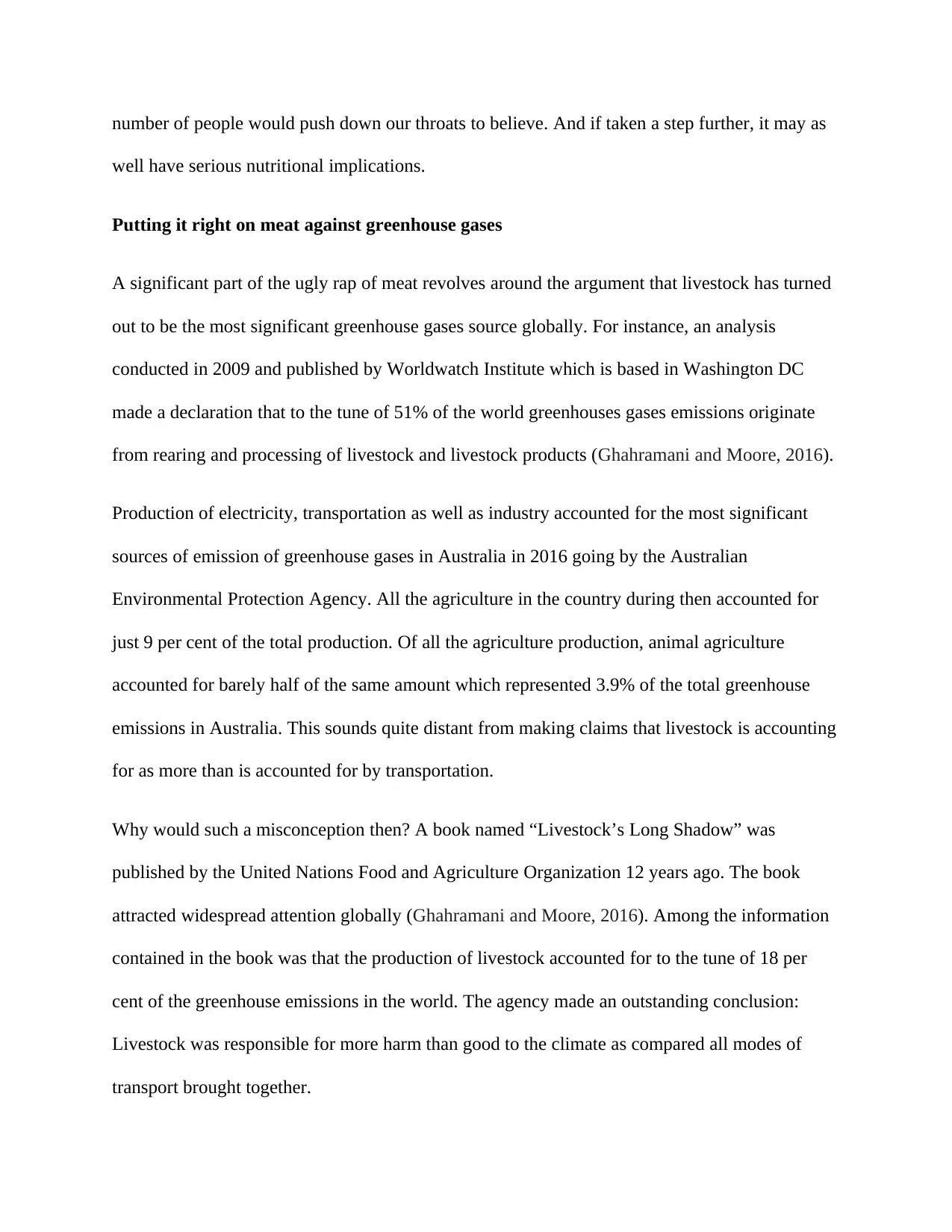
number of people would push down our throats to believe. And if taken a step further, it may as
well have serious nutritional implications.
Putting it right on meat against greenhouse gases
A significant part of the ugly rap of meat revolves around the argument that livestock has turned
out to be the most significant greenhouse gases source globally. For instance, an analysis
conducted in 2009 and published by Worldwatch Institute which is based in Washington DC
made a declaration that to the tune of 51% of the world greenhouses gases emissions originate
from rearing and processing of livestock and livestock products (Ghahramani and Moore, 2016).
Production of electricity, transportation as well as industry accounted for the most significant
sources of emission of greenhouse gases in Australia in 2016 going by the Australian
Environmental Protection Agency. All the agriculture in the country during then accounted for
just 9 per cent of the total production. Of all the agriculture production, animal agriculture
accounted for barely half of the same amount which represented 3.9% of the total greenhouse
emissions in Australia. This sounds quite distant from making claims that livestock is accounting
for as more than is accounted for by transportation.
Why would such a misconception then? A book named “Livestock’s Long Shadow” was
published by the United Nations Food and Agriculture Organization 12 years ago. The book
attracted widespread attention globally (Ghahramani and Moore, 2016). Among the information
contained in the book was that the production of livestock accounted for to the tune of 18 per
cent of the greenhouse emissions in the world. The agency made an outstanding conclusion:
Livestock was responsible for more harm than good to the climate as compared all modes of
transport brought together.
well have serious nutritional implications.
Putting it right on meat against greenhouse gases
A significant part of the ugly rap of meat revolves around the argument that livestock has turned
out to be the most significant greenhouse gases source globally. For instance, an analysis
conducted in 2009 and published by Worldwatch Institute which is based in Washington DC
made a declaration that to the tune of 51% of the world greenhouses gases emissions originate
from rearing and processing of livestock and livestock products (Ghahramani and Moore, 2016).
Production of electricity, transportation as well as industry accounted for the most significant
sources of emission of greenhouse gases in Australia in 2016 going by the Australian
Environmental Protection Agency. All the agriculture in the country during then accounted for
just 9 per cent of the total production. Of all the agriculture production, animal agriculture
accounted for barely half of the same amount which represented 3.9% of the total greenhouse
emissions in Australia. This sounds quite distant from making claims that livestock is accounting
for as more than is accounted for by transportation.
Why would such a misconception then? A book named “Livestock’s Long Shadow” was
published by the United Nations Food and Agriculture Organization 12 years ago. The book
attracted widespread attention globally (Ghahramani and Moore, 2016). Among the information
contained in the book was that the production of livestock accounted for to the tune of 18 per
cent of the greenhouse emissions in the world. The agency made an outstanding conclusion:
Livestock was responsible for more harm than good to the climate as compared all modes of
transport brought together.
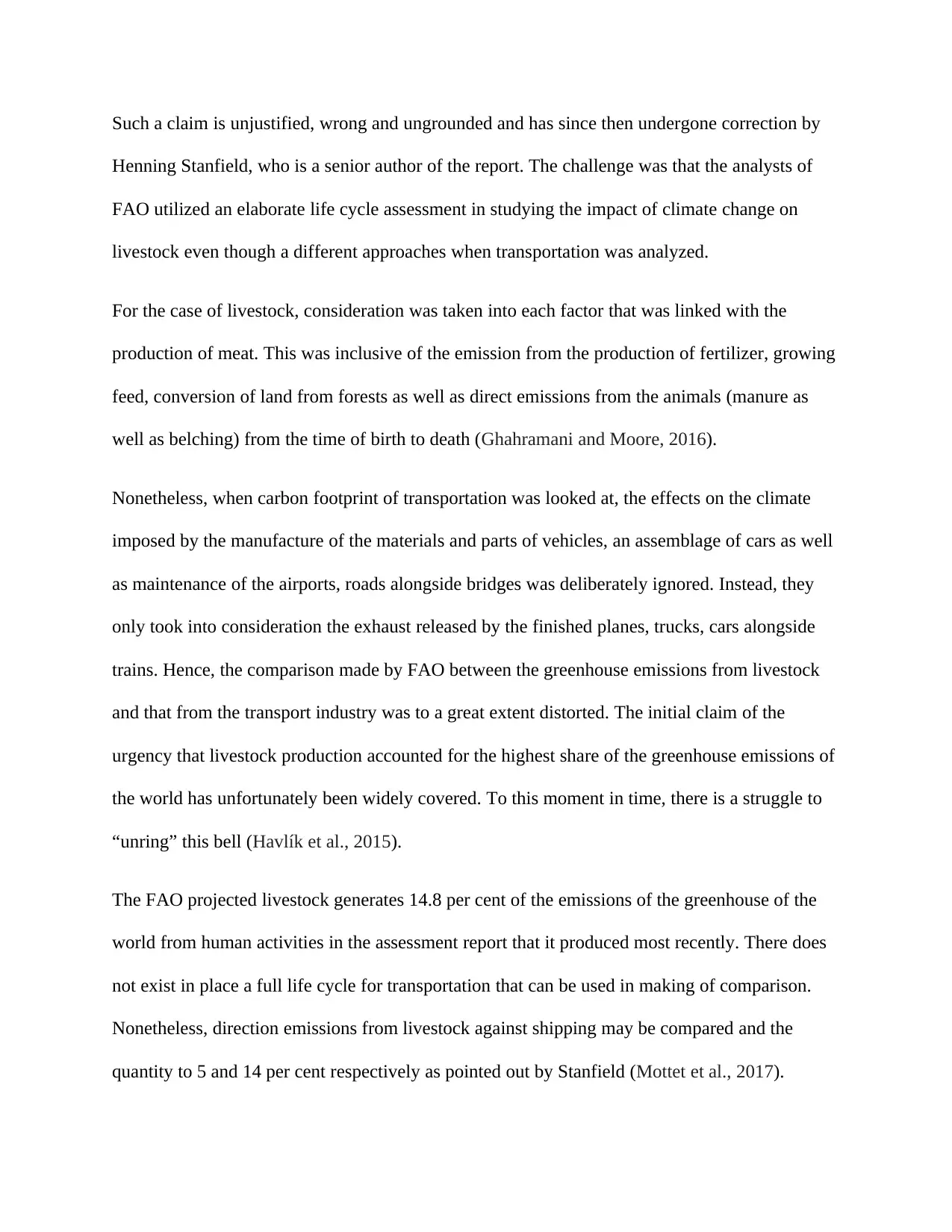
Such a claim is unjustified, wrong and ungrounded and has since then undergone correction by
Henning Stanfield, who is a senior author of the report. The challenge was that the analysts of
FAO utilized an elaborate life cycle assessment in studying the impact of climate change on
livestock even though a different approaches when transportation was analyzed.
For the case of livestock, consideration was taken into each factor that was linked with the
production of meat. This was inclusive of the emission from the production of fertilizer, growing
feed, conversion of land from forests as well as direct emissions from the animals (manure as
well as belching) from the time of birth to death (Ghahramani and Moore, 2016).
Nonetheless, when carbon footprint of transportation was looked at, the effects on the climate
imposed by the manufacture of the materials and parts of vehicles, an assemblage of cars as well
as maintenance of the airports, roads alongside bridges was deliberately ignored. Instead, they
only took into consideration the exhaust released by the finished planes, trucks, cars alongside
trains. Hence, the comparison made by FAO between the greenhouse emissions from livestock
and that from the transport industry was to a great extent distorted. The initial claim of the
urgency that livestock production accounted for the highest share of the greenhouse emissions of
the world has unfortunately been widely covered. To this moment in time, there is a struggle to
“unring” this bell (Havlík et al., 2015).
The FAO projected livestock generates 14.8 per cent of the emissions of the greenhouse of the
world from human activities in the assessment report that it produced most recently. There does
not exist in place a full life cycle for transportation that can be used in making of comparison.
Nonetheless, direction emissions from livestock against shipping may be compared and the
quantity to 5 and 14 per cent respectively as pointed out by Stanfield (Mottet et al., 2017).
Henning Stanfield, who is a senior author of the report. The challenge was that the analysts of
FAO utilized an elaborate life cycle assessment in studying the impact of climate change on
livestock even though a different approaches when transportation was analyzed.
For the case of livestock, consideration was taken into each factor that was linked with the
production of meat. This was inclusive of the emission from the production of fertilizer, growing
feed, conversion of land from forests as well as direct emissions from the animals (manure as
well as belching) from the time of birth to death (Ghahramani and Moore, 2016).
Nonetheless, when carbon footprint of transportation was looked at, the effects on the climate
imposed by the manufacture of the materials and parts of vehicles, an assemblage of cars as well
as maintenance of the airports, roads alongside bridges was deliberately ignored. Instead, they
only took into consideration the exhaust released by the finished planes, trucks, cars alongside
trains. Hence, the comparison made by FAO between the greenhouse emissions from livestock
and that from the transport industry was to a great extent distorted. The initial claim of the
urgency that livestock production accounted for the highest share of the greenhouse emissions of
the world has unfortunately been widely covered. To this moment in time, there is a struggle to
“unring” this bell (Havlík et al., 2015).
The FAO projected livestock generates 14.8 per cent of the emissions of the greenhouse of the
world from human activities in the assessment report that it produced most recently. There does
not exist in place a full life cycle for transportation that can be used in making of comparison.
Nonetheless, direction emissions from livestock against shipping may be compared and the
quantity to 5 and 14 per cent respectively as pointed out by Stanfield (Mottet et al., 2017).
Secure Best Marks with AI Grader
Need help grading? Try our AI Grader for instant feedback on your assignments.
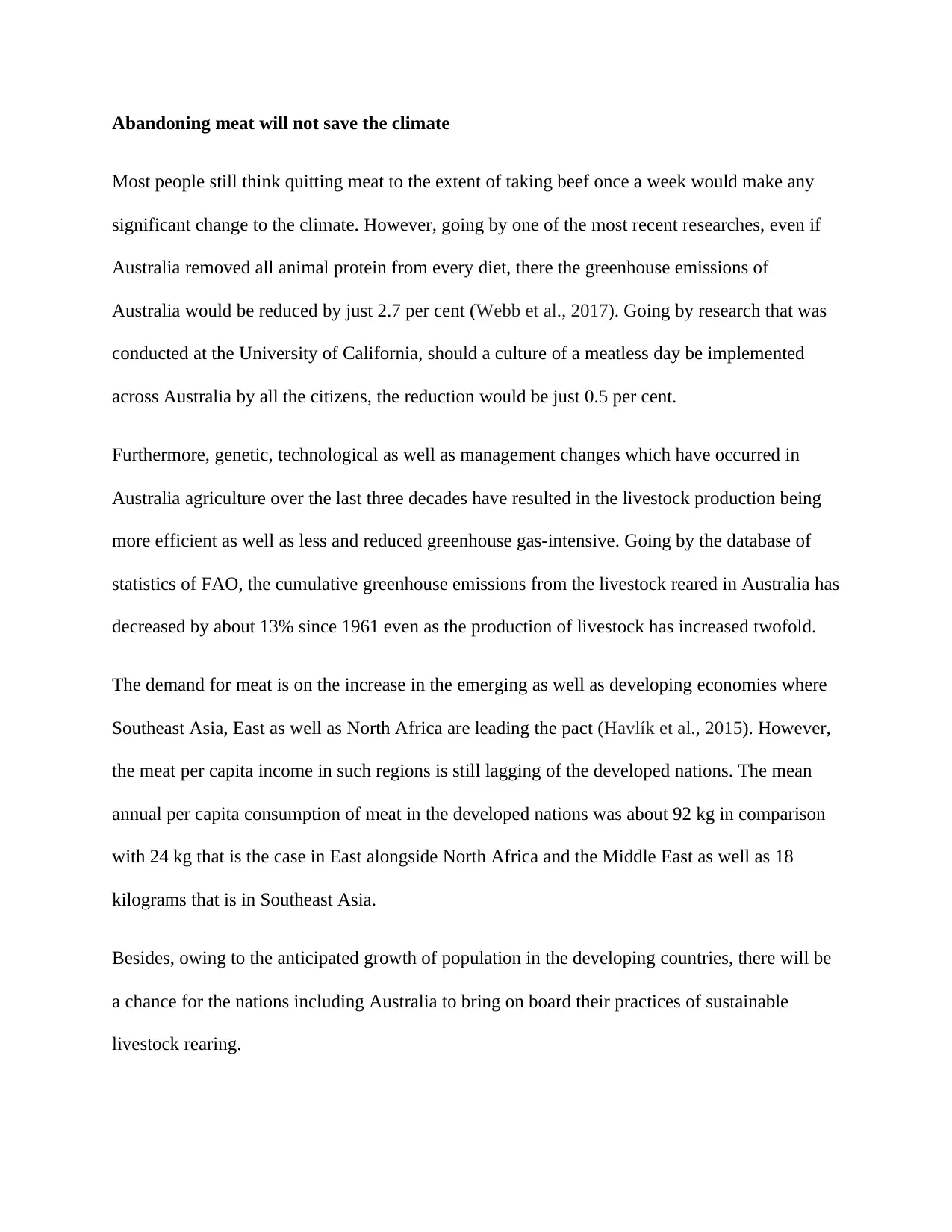
Abandoning meat will not save the climate
Most people still think quitting meat to the extent of taking beef once a week would make any
significant change to the climate. However, going by one of the most recent researches, even if
Australia removed all animal protein from every diet, there the greenhouse emissions of
Australia would be reduced by just 2.7 per cent (Webb et al., 2017). Going by research that was
conducted at the University of California, should a culture of a meatless day be implemented
across Australia by all the citizens, the reduction would be just 0.5 per cent.
Furthermore, genetic, technological as well as management changes which have occurred in
Australia agriculture over the last three decades have resulted in the livestock production being
more efficient as well as less and reduced greenhouse gas-intensive. Going by the database of
statistics of FAO, the cumulative greenhouse emissions from the livestock reared in Australia has
decreased by about 13% since 1961 even as the production of livestock has increased twofold.
The demand for meat is on the increase in the emerging as well as developing economies where
Southeast Asia, East as well as North Africa are leading the pact (Havlík et al., 2015). However,
the meat per capita income in such regions is still lagging of the developed nations. The mean
annual per capita consumption of meat in the developed nations was about 92 kg in comparison
with 24 kg that is the case in East alongside North Africa and the Middle East as well as 18
kilograms that is in Southeast Asia.
Besides, owing to the anticipated growth of population in the developing countries, there will be
a chance for the nations including Australia to bring on board their practices of sustainable
livestock rearing.
Most people still think quitting meat to the extent of taking beef once a week would make any
significant change to the climate. However, going by one of the most recent researches, even if
Australia removed all animal protein from every diet, there the greenhouse emissions of
Australia would be reduced by just 2.7 per cent (Webb et al., 2017). Going by research that was
conducted at the University of California, should a culture of a meatless day be implemented
across Australia by all the citizens, the reduction would be just 0.5 per cent.
Furthermore, genetic, technological as well as management changes which have occurred in
Australia agriculture over the last three decades have resulted in the livestock production being
more efficient as well as less and reduced greenhouse gas-intensive. Going by the database of
statistics of FAO, the cumulative greenhouse emissions from the livestock reared in Australia has
decreased by about 13% since 1961 even as the production of livestock has increased twofold.
The demand for meat is on the increase in the emerging as well as developing economies where
Southeast Asia, East as well as North Africa are leading the pact (Havlík et al., 2015). However,
the meat per capita income in such regions is still lagging of the developed nations. The mean
annual per capita consumption of meat in the developed nations was about 92 kg in comparison
with 24 kg that is the case in East alongside North Africa and the Middle East as well as 18
kilograms that is in Southeast Asia.
Besides, owing to the anticipated growth of population in the developing countries, there will be
a chance for the nations including Australia to bring on board their practices of sustainable
livestock rearing.
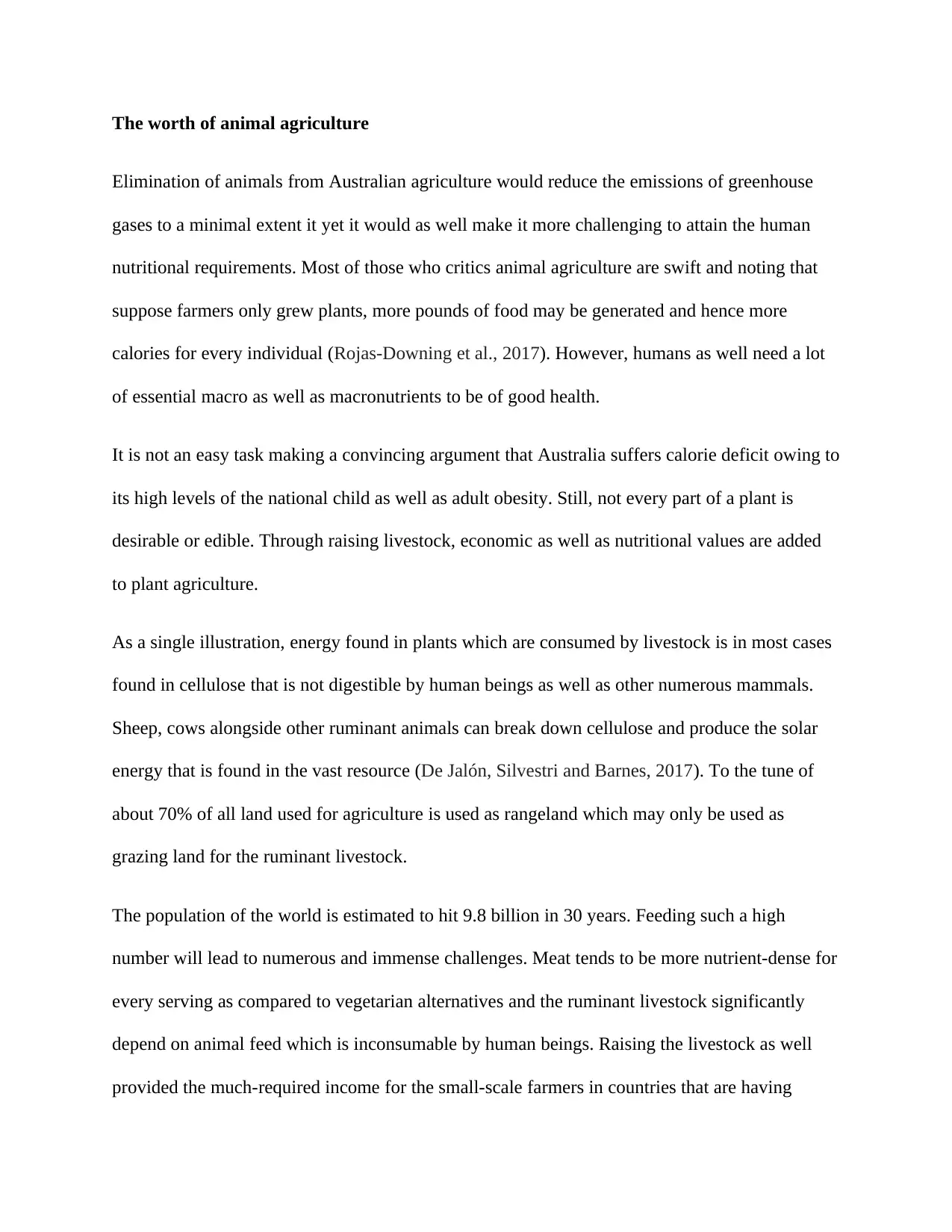
The worth of animal agriculture
Elimination of animals from Australian agriculture would reduce the emissions of greenhouse
gases to a minimal extent it yet it would as well make it more challenging to attain the human
nutritional requirements. Most of those who critics animal agriculture are swift and noting that
suppose farmers only grew plants, more pounds of food may be generated and hence more
calories for every individual (Rojas-Downing et al., 2017). However, humans as well need a lot
of essential macro as well as macronutrients to be of good health.
It is not an easy task making a convincing argument that Australia suffers calorie deficit owing to
its high levels of the national child as well as adult obesity. Still, not every part of a plant is
desirable or edible. Through raising livestock, economic as well as nutritional values are added
to plant agriculture.
As a single illustration, energy found in plants which are consumed by livestock is in most cases
found in cellulose that is not digestible by human beings as well as other numerous mammals.
Sheep, cows alongside other ruminant animals can break down cellulose and produce the solar
energy that is found in the vast resource (De Jalón, Silvestri and Barnes, 2017). To the tune of
about 70% of all land used for agriculture is used as rangeland which may only be used as
grazing land for the ruminant livestock.
The population of the world is estimated to hit 9.8 billion in 30 years. Feeding such a high
number will lead to numerous and immense challenges. Meat tends to be more nutrient-dense for
every serving as compared to vegetarian alternatives and the ruminant livestock significantly
depend on animal feed which is inconsumable by human beings. Raising the livestock as well
provided the much-required income for the small-scale farmers in countries that are having
Elimination of animals from Australian agriculture would reduce the emissions of greenhouse
gases to a minimal extent it yet it would as well make it more challenging to attain the human
nutritional requirements. Most of those who critics animal agriculture are swift and noting that
suppose farmers only grew plants, more pounds of food may be generated and hence more
calories for every individual (Rojas-Downing et al., 2017). However, humans as well need a lot
of essential macro as well as macronutrients to be of good health.
It is not an easy task making a convincing argument that Australia suffers calorie deficit owing to
its high levels of the national child as well as adult obesity. Still, not every part of a plant is
desirable or edible. Through raising livestock, economic as well as nutritional values are added
to plant agriculture.
As a single illustration, energy found in plants which are consumed by livestock is in most cases
found in cellulose that is not digestible by human beings as well as other numerous mammals.
Sheep, cows alongside other ruminant animals can break down cellulose and produce the solar
energy that is found in the vast resource (De Jalón, Silvestri and Barnes, 2017). To the tune of
about 70% of all land used for agriculture is used as rangeland which may only be used as
grazing land for the ruminant livestock.
The population of the world is estimated to hit 9.8 billion in 30 years. Feeding such a high
number will lead to numerous and immense challenges. Meat tends to be more nutrient-dense for
every serving as compared to vegetarian alternatives and the ruminant livestock significantly
depend on animal feed which is inconsumable by human beings. Raising the livestock as well
provided the much-required income for the small-scale farmers in countries that are having
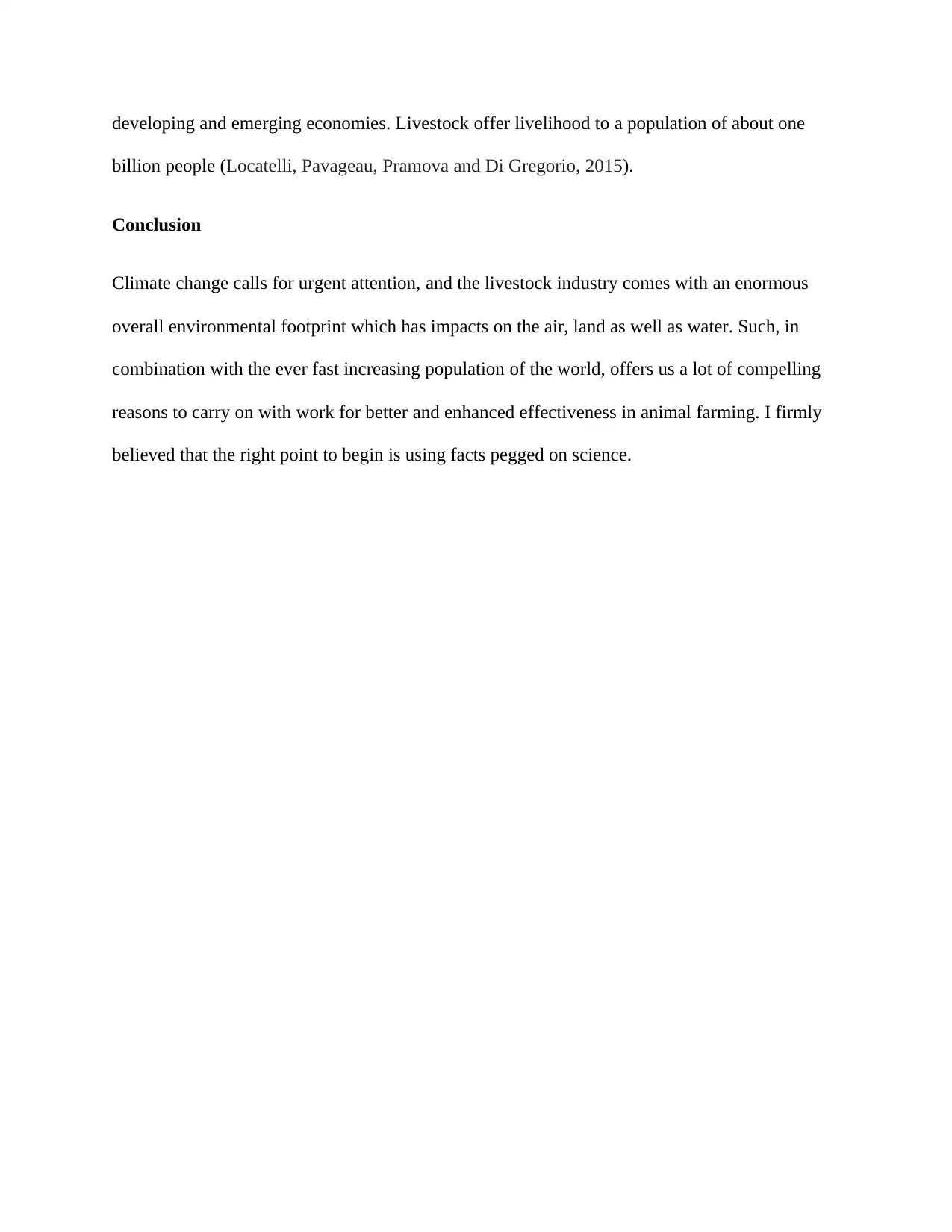
developing and emerging economies. Livestock offer livelihood to a population of about one
billion people (Locatelli, Pavageau, Pramova and Di Gregorio, 2015).
Conclusion
Climate change calls for urgent attention, and the livestock industry comes with an enormous
overall environmental footprint which has impacts on the air, land as well as water. Such, in
combination with the ever fast increasing population of the world, offers us a lot of compelling
reasons to carry on with work for better and enhanced effectiveness in animal farming. I firmly
believed that the right point to begin is using facts pegged on science.
billion people (Locatelli, Pavageau, Pramova and Di Gregorio, 2015).
Conclusion
Climate change calls for urgent attention, and the livestock industry comes with an enormous
overall environmental footprint which has impacts on the air, land as well as water. Such, in
combination with the ever fast increasing population of the world, offers us a lot of compelling
reasons to carry on with work for better and enhanced effectiveness in animal farming. I firmly
believed that the right point to begin is using facts pegged on science.
Paraphrase This Document
Need a fresh take? Get an instant paraphrase of this document with our AI Paraphraser
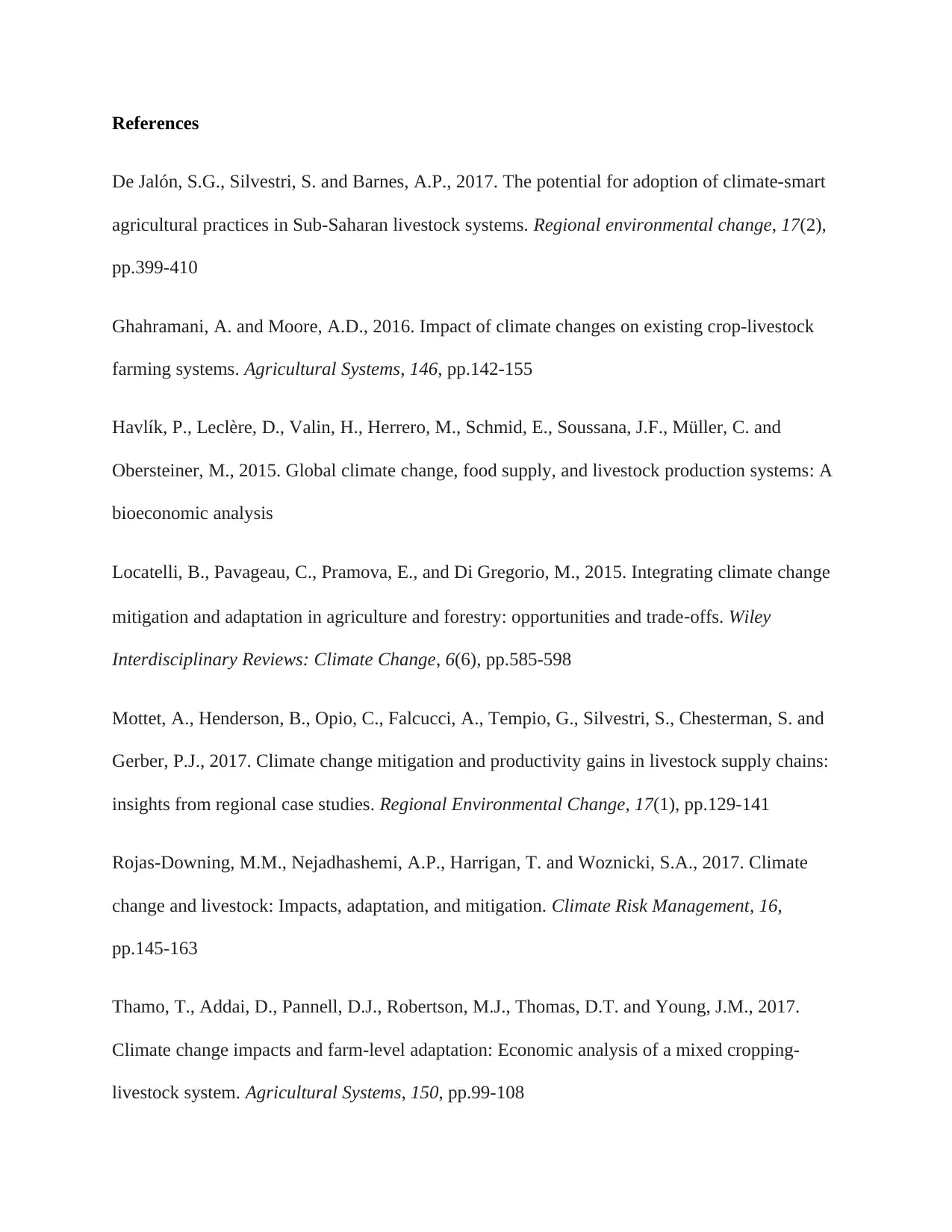
References
De Jalón, S.G., Silvestri, S. and Barnes, A.P., 2017. The potential for adoption of climate-smart
agricultural practices in Sub-Saharan livestock systems. Regional environmental change, 17(2),
pp.399-410
Ghahramani, A. and Moore, A.D., 2016. Impact of climate changes on existing crop-livestock
farming systems. Agricultural Systems, 146, pp.142-155
Havlík, P., Leclère, D., Valin, H., Herrero, M., Schmid, E., Soussana, J.F., Müller, C. and
Obersteiner, M., 2015. Global climate change, food supply, and livestock production systems: A
bioeconomic analysis
Locatelli, B., Pavageau, C., Pramova, E., and Di Gregorio, M., 2015. Integrating climate change
mitigation and adaptation in agriculture and forestry: opportunities and trade‐offs. Wiley
Interdisciplinary Reviews: Climate Change, 6(6), pp.585-598
Mottet, A., Henderson, B., Opio, C., Falcucci, A., Tempio, G., Silvestri, S., Chesterman, S. and
Gerber, P.J., 2017. Climate change mitigation and productivity gains in livestock supply chains:
insights from regional case studies. Regional Environmental Change, 17(1), pp.129-141
Rojas-Downing, M.M., Nejadhashemi, A.P., Harrigan, T. and Woznicki, S.A., 2017. Climate
change and livestock: Impacts, adaptation, and mitigation. Climate Risk Management, 16,
pp.145-163
Thamo, T., Addai, D., Pannell, D.J., Robertson, M.J., Thomas, D.T. and Young, J.M., 2017.
Climate change impacts and farm-level adaptation: Economic analysis of a mixed cropping-
livestock system. Agricultural Systems, 150, pp.99-108
De Jalón, S.G., Silvestri, S. and Barnes, A.P., 2017. The potential for adoption of climate-smart
agricultural practices in Sub-Saharan livestock systems. Regional environmental change, 17(2),
pp.399-410
Ghahramani, A. and Moore, A.D., 2016. Impact of climate changes on existing crop-livestock
farming systems. Agricultural Systems, 146, pp.142-155
Havlík, P., Leclère, D., Valin, H., Herrero, M., Schmid, E., Soussana, J.F., Müller, C. and
Obersteiner, M., 2015. Global climate change, food supply, and livestock production systems: A
bioeconomic analysis
Locatelli, B., Pavageau, C., Pramova, E., and Di Gregorio, M., 2015. Integrating climate change
mitigation and adaptation in agriculture and forestry: opportunities and trade‐offs. Wiley
Interdisciplinary Reviews: Climate Change, 6(6), pp.585-598
Mottet, A., Henderson, B., Opio, C., Falcucci, A., Tempio, G., Silvestri, S., Chesterman, S. and
Gerber, P.J., 2017. Climate change mitigation and productivity gains in livestock supply chains:
insights from regional case studies. Regional Environmental Change, 17(1), pp.129-141
Rojas-Downing, M.M., Nejadhashemi, A.P., Harrigan, T. and Woznicki, S.A., 2017. Climate
change and livestock: Impacts, adaptation, and mitigation. Climate Risk Management, 16,
pp.145-163
Thamo, T., Addai, D., Pannell, D.J., Robertson, M.J., Thomas, D.T. and Young, J.M., 2017.
Climate change impacts and farm-level adaptation: Economic analysis of a mixed cropping-
livestock system. Agricultural Systems, 150, pp.99-108
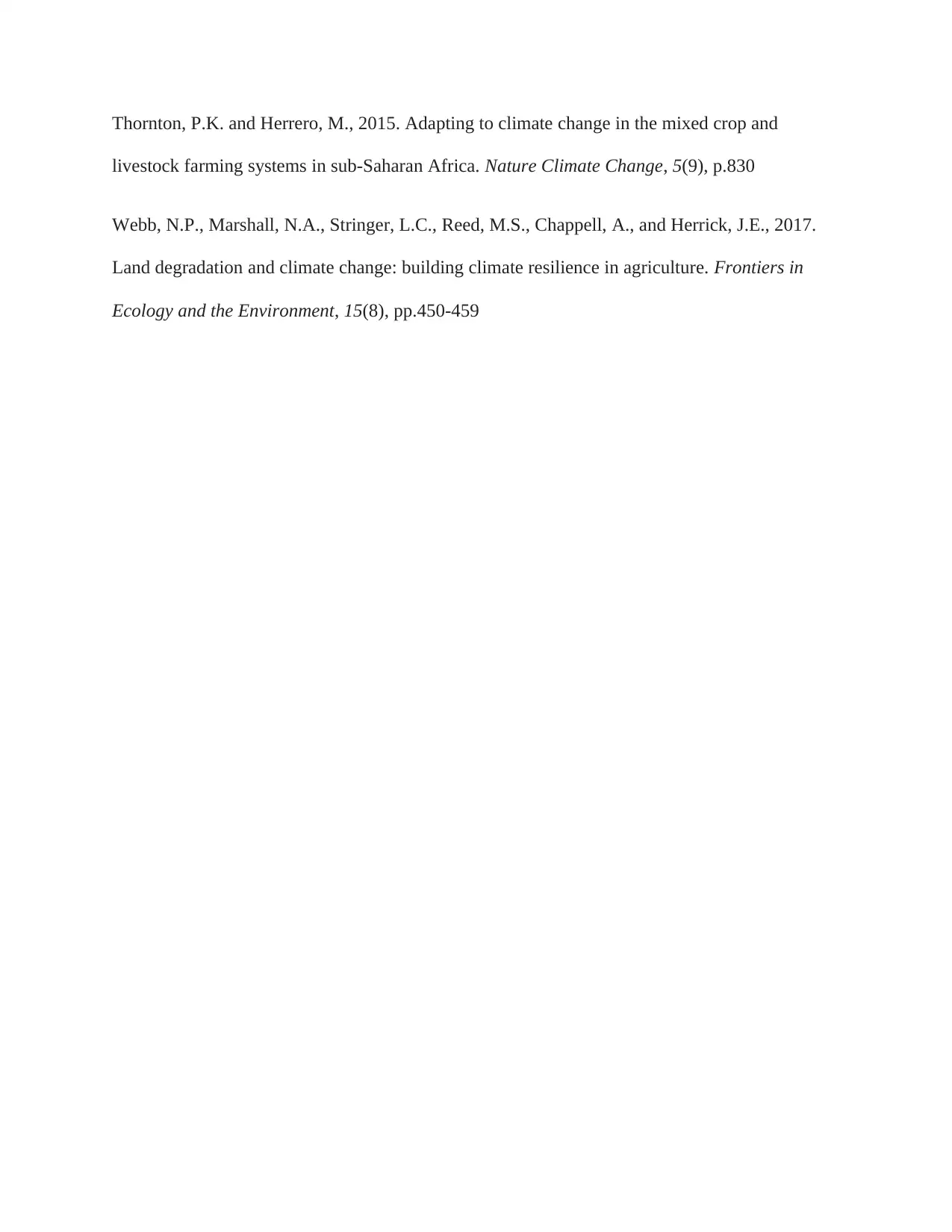
Thornton, P.K. and Herrero, M., 2015. Adapting to climate change in the mixed crop and
livestock farming systems in sub-Saharan Africa. Nature Climate Change, 5(9), p.830
Webb, N.P., Marshall, N.A., Stringer, L.C., Reed, M.S., Chappell, A., and Herrick, J.E., 2017.
Land degradation and climate change: building climate resilience in agriculture. Frontiers in
Ecology and the Environment, 15(8), pp.450-459
livestock farming systems in sub-Saharan Africa. Nature Climate Change, 5(9), p.830
Webb, N.P., Marshall, N.A., Stringer, L.C., Reed, M.S., Chappell, A., and Herrick, J.E., 2017.
Land degradation and climate change: building climate resilience in agriculture. Frontiers in
Ecology and the Environment, 15(8), pp.450-459
1 out of 9
Related Documents
Your All-in-One AI-Powered Toolkit for Academic Success.
+13062052269
info@desklib.com
Available 24*7 on WhatsApp / Email
![[object Object]](/_next/static/media/star-bottom.7253800d.svg)
Unlock your academic potential
© 2024 | Zucol Services PVT LTD | All rights reserved.




